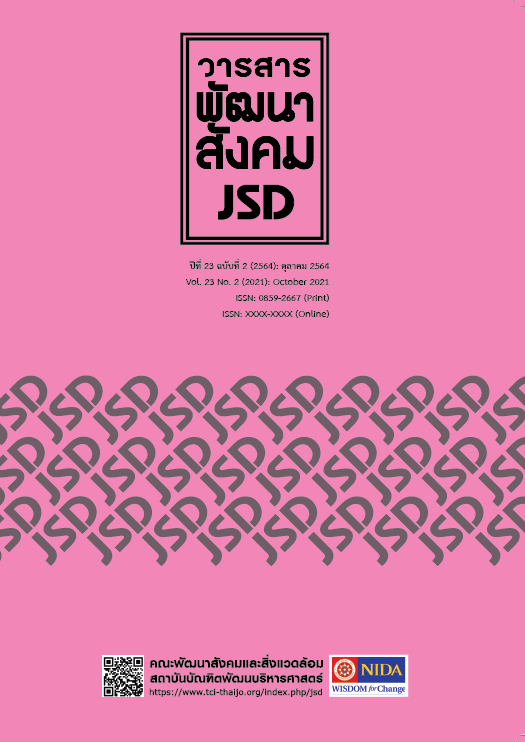Social Movements of The Student Group Called “New Democracy Movement”
Main Article Content
Abstract
The research found that student integration is conditioned based on both political and social aspects in which members of the group clearly support democracy. Their shared attitude is that the political system should be based on democratic political processes. The movement and operations stick with five main principles including democracy, justice, participation, human rights, and peaceful means. The external factors that became their problems and obstacles were the government and NCPO’s monitoring and controlling of their movement, and the attacking from opponents’ bogus information. The internal factors that made them difficulty to achieve their mission include inefficient English communication, the lack of colorful and creativity political activities, the shortage of mass support, unnecessary dependent on individual members’ ways of work, and the long-term problems of using online media.
Article Details

This work is licensed under a Creative Commons Attribution-NonCommercial-NoDerivatives 4.0 International License.
References
Arachananan, C. (2018). Democracy in a universal view. [In Thai]. Individual Study. College of the Constitutional Court.
Charoensin-olan, C. (2002). New Social movement. [In Thai]. Bangkok: Vibhasa Publisher.
Chueathong, S. (2011). Buddhist democracy. [In Thai]. Journal of Yanasangvorn Research Institute Mahamakut Buddhist University, 2(1), 77-88.
Chuklin, N. (2017). Appropriate Democratic Approach in the Author's View. [In Thai]. Academic Article. College of the Constitutional Court.
Chumphon, P. (2003). Definition of Social Movement. [In Thai]. Bangkok: Chulalongkorn University Press.
Duangsawat, C. (2013). The Correlation between the study in the Faculty of Political Science and Public Administration and student's political role. [In Thai]. (Independent Study). Chiang Mai University.
Kasetsiri, C. (2001). History of Thai politics: 1932-1957. [In Thai]. Thammasat University: The Foundation for the Promotion of Social Sciences and Humanities.
Keyunwan, C. (2006). Social movement in Thailand. [In Thai]. Bangkok: Labor Democracy Publisher.
Khunchaimang, S. (2012). Cyberspace and New Social Movements in Thailand (2006 - 2011). [In Thai]. (Doctoral dissertation). Chandrakasem Rajabhat University.
Mankhasakun, T. (2014). New social movement in Thailand. [In Thai]. (Master’ Thesis). Chiang Mai University.
Phumarin, C. (2017). Democracy in the context of Thai society. [In Thai]. Individual Study. College of the Constitutional Court.
Pintoptaeng, P. (2009). Framework for analysis of social movement theory. [In Thai]. Chiang Mai: The Heinrich Böll Foundation, Southeast Asia Regional Office.
Ponjarern, W. (2011). Documents for lecture on Thai politics and government. [In Thai]. College of Politics and Governance. Mahasarakham University.
Prasoetkun, S. (2009). Civil Politics in Thai democracy. 2nd ed. [In Thai]. Bangkok: Amarin Publishers.
Rungthipanon, O. (2015). Thai democracy and world democracy. [In Thai]. Academic Article. The Secretariat of the House of Representatives.
Singhsomboon, S. (2018). Principle of democracy. [In Thai]. Individual Study. College of the Constitutional Court.
Thammaniwong, S. (2001). Social Movement. [In Thai]. Journal of the Faculty of Arts. Silpakorn University, 23(2), 32-54.
Wipatphumprathet, T. (2013). Democratic Citizenship of Dhurakij Pundit University Students. [In Thai]. (Research Report). Dhurakij Pundit University Research Development and Innovation. Bangkok: Dhurakij Pundit University.


